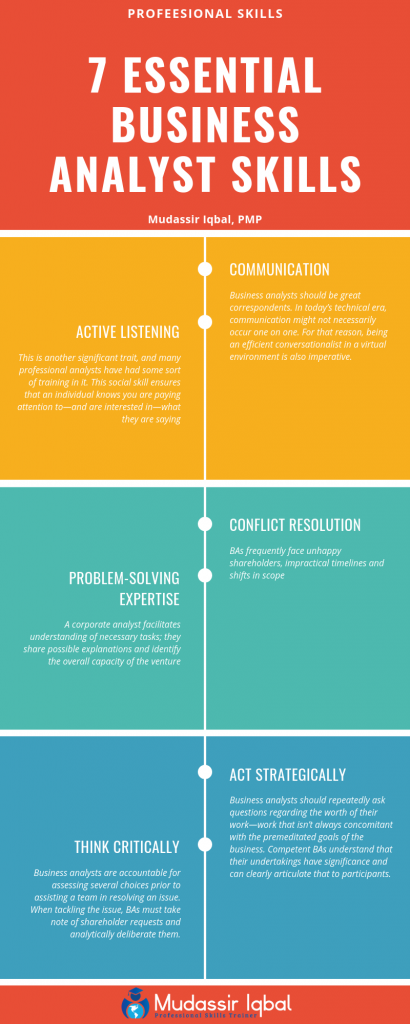7 Essential Business Analyst Skills
A business analyst deals with corporate evaluation and modelling on an everyday basis. If you are contemplating becoming a professional analyst, you’re in the right place. If you want to stand out and enhance the productivity of your business, this list shares important corporate analyst strengths:

1. Communication: Business analysts should be great correspondents. They should be capable of facilitating workplace conferences, asking for queries (and taking note of the responses), and constructively understanding what is being said. In today’s technical era, communication might not necessarily occur one on one. For that reason, being an efficient conversationalist in a virtual environment is also imperative.

Being a new BA, you may lack sufficient experience in diverse business analyst qualifications that gradually come over time (and through multiple ventures). However, effective recording and writing abilities will help you get on track faster.
2. Active listening: This is another significant trait, and many professional analysts have had some sort of training in it. This social skill ensures that an individual knows you are paying attention to—and are interested in—what they are saying. Active listening can be achieved by maintaining eye contact, observing body language and paraphrasing what they say back to them. (Remember, paraphrasing is not just repeating back the exact words they said, but also trying to express the spirit of what they said using other words with the same meaning. This shows that you have grasped their intent.)
Speaking from an instructional perspective, someone needs to teach you how to effectively read body language. Moreover, active listening is a two-way communication; that means not only do you need to read body language, but also “speak” with yours. Make sure you send the correct signals since you need to assume that the other individual can read them.
3. Conflict resolution: BAs frequently face unhappy shareholders, impractical timelines and shifts in scope. At times, their hard work may seem fruitless, as they authorize and present needs that turn out to be entirely useless when the sponsor sees the report and wants something else. Under these circumstances, connecting with participants, evaluating the relevancy of recommendations to corporate principles, and dealing with new necessities from management is imperative.
Like project managers, corporate specialists cannot be easily distressed. They recognize that many things are out of their control, and oftentimes they are held responsible for things beyond their scope. However, they must keep up the pace. Business analysts are capable of managing the consistently changing goals, preferences and concerns of stakeholders (though they may not necessarily accommodate everyone). Additionally, they need to comprehend that it’s an important component of the procedure; there will often be uncertain delays or issues that affect deliverables and timelines.
4. Problem-solving expertise: Every venture comes with certain trials. A corporate analyst facilitates understanding of necessary tasks; they share possible explanations and identify the overall capacity of the venture. You’ll frequently observe many BAs among the assisting groups who resolve technical issues, particularly when they include a compromise between corporate or technical shareholders. This starts with evaluating the commerce procedure.
5. Act strategically: Business analysts should repeatedly ask questions regarding the worth of their work—work that isn’t always concomitant with the premeditated goals of the business. Competent BAs understand that their undertakings have significance and can clearly articulate that to participants.
Additionally, they always look for different ways to find value for the business considering the corporate strategic goals. Consequently, a business analyst may recommend the association of two overlapping projects or highlight a vision for procedure re-engineering that cuts down costs.
Great BAs demonstrate that they are not simply IT people; rather, they completely comprehend the requirements and goals of the company and find multiple ways to help it understand its objectives more effectively.
A business analyst must be proficient when it comes to strategic thinking. They have the authority to act on many prospects themselves and still formulate compelling arguments to take action. By doing so, they perform selflessly for the greater good of the business (and for that, they must know how to efficiently communicate the significance in their recommendations).
6. Think critically: Business analysts are accountable for assessing several choices prior to assisting a team in resolving an issue. When tackling the issue, BAs must take note of shareholder requests and analytically deliberate them. After thorough scrutiny of the situation, they should ask analytical queries until the actual requisite is assumed. This refers to analytical intelligence and evaluating abilities essential for young business analysts. Effective communication, problem-solving and logical thinking abilities are fundamental pillars of the professional analyst.
7. Attention to detail: One important yet frequently neglected characteristic of a business analyst is giving attention to the details. To be a good analyst, you need to know the implication of emphasizing precise details that are documented and communicated properly. BAs should be skilled at managing a massive amount of finely detailed info. They should be capable of competently scaling their message and thought process. With proper attention to detail, business analysts ensure that the real elucidations procured meet client requests.
Final Thoughts
To be a successful business analyst, you must have diverse capabilities and be adaptable. Every BA has an exclusive blend of expertise and understanding of their role. Feel free to write about any other expertise that you find helpful in your BA occupation—I would highly appreciate your input.

